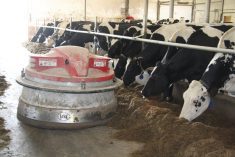As a dominant presence in the world beef trade, the meat packing giant IBP has felt the repercussions of economic hardship in Asia.
South Korea was a major buyer of cattle hides but devalued currency has hurt its ability to pay. Lower hide values have knocked $20 a head off the value of a carcass, said Roel Andriessen, IBP vice-president of international sales.
Products like hides, tallow and bone meal account for about 12 percent of the value of a fed steer. More than half those products are exported and hides are the most valuable.
Read Also

Manitoba extends Crown land rent freeze
Manitoba government links the continued rental rate freeze on grazing and forage leases to economic and environmental challenges facing the industry
“It is a major financial hit for all of us,” said Andriessen at the recent Canada Beef Export Federation meeting in Calgary.
Money troubles in Russia also had an effect. Russia was a major buyer of beef livers but that has stopped because of its economic collapse.
Other countries are substituting cheaper cuts like rounds and chucks instead of higher value loins.
IBP has had a formal international sales wing since 1981 and penetrated markets like Europe and the Pacific Rim before any other company. Last year export sales totaled $1.7 billion (U.S.) or 13 percent of business.
IBP owns a Japanese plant that produces a variety of cuts specific to Japan. It also has a joint venture in a pork company, Nippon Meat Packers, to provide pork cuts according to Japanese specifications.
IBP has a presence in Canada since it bought the Lakeside Packers plant at Brooks, Alta., several years ago.
This fall the company went to a double shift in Brooks, capable of killing 22,000 head per week. It should reach that volume by the end of next year.
“The second shift will ultimately allow Lakeside to process one third of the Canadian kill,” Andriessen said.
The second shift employs an additional 700 people, which brings the plant staff up to 2,500. About half of what Lakeside produces is exported to the United States or Asia.
The company is opposed to country of origin labeling and urges Canada to adopt a strong export mentality where it is willing to deal with problems surrounding exports like lead levels in meat, E. coli, hormone implants and currency fluctuations.















